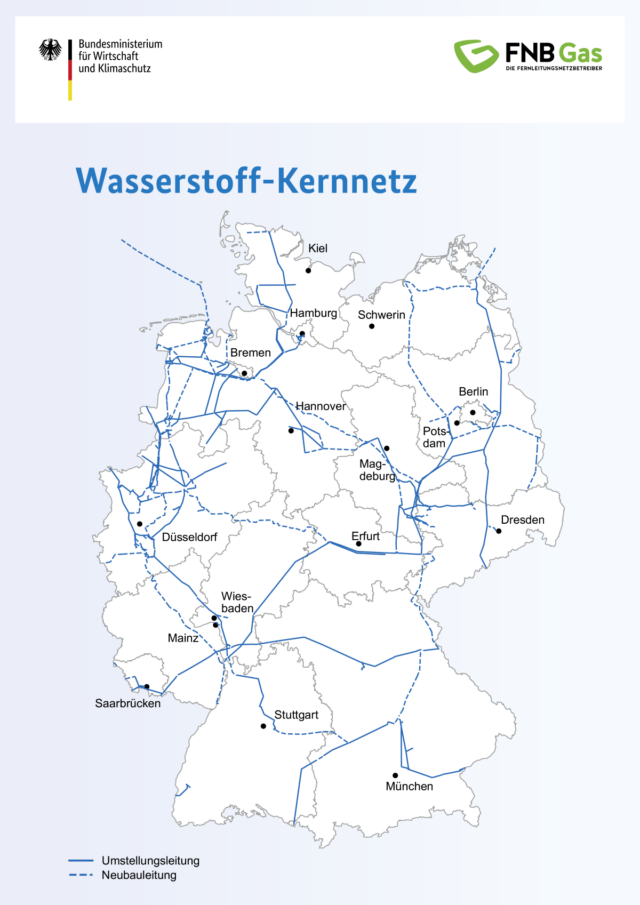Germany progresses Hydrogen Core Network project
By Julian Atchison on July 02, 2024
€3 billion to be granted in state assistance

Click to expand. The latest draft map of the German Hydrogen Core Network. Umstellungleitung = converted fossil gas pipelines; Neubauleitung = new build hydrogen pipelines. Source: FNB Gas.
The European Commission has approved a €3 billion German scheme to support the construction of the Hydrogen Core Network (HCN). The HCN will act as the foundation of a long-distance, pipeline transport network for hydrogen within Germany, as well as connecting to several EU states and the continent-wide European Hydrogen Backbone. The scheme will focus on repurposing existing fossil gas pipelines to enable them to carry hydrogen, as well as the building of new hydrogen pipelines and compressor stations.
The €3 billion in state assistance will take the form of loans granted by the German national promotional bank Kreditanstalt für Wiederaufbau, and will be extended to the first network operators of the HCN to cover losses:
The construction and operation of the HCN will be financed by hydrogen transmission system operators (TSOs), who will be selected by the German federal network agency, Bundesnetzagentur. The aid will take the form of a State guarantee which will allow the TSOs to obtain more favourable loans to cover initial losses in the ramp-up phase of the HCN. At first, Germany expects only a small number of consumers to be using the network, and the tariffs will be lower than otherwise needed to cover relevant costs, to encourage this use and facilitate the uptake of hydrogen.
Details of state assistance for the construction of the German Hydrogen Core Network, from the European Commission’s official press release, 21 June 2024
The first major pipeline in the HCN is expected to be operational from 2025, with the completion of the entire network expected in 2032. In February a number of complementary pipeline development projects were awarded funding by the EU under the Important Project of Common European Interest (IPCEI) framework. Nine of the eleven pipeline projects included in the continent-wide “Hy2Infra” scheme were led by German companies.
A core network of pipelines to transport hydrogen is crucial to trigger investments in hydrogen production and consumption, and can help accelerate the green transition. The German scheme approved today will significantly contribute to the development of a European hydrogen market while minimising any potential distortions to competition.
Margrethe Vestager, Executive Vice-President of Competition Policy in the European Commission’s official press release, 21 June 2024
In November 2023, the association of German gas transmission grid operators (FNB Gas) submitted its draft plan for the HCN to the relevant federal agencies, with the plan now in the final stages of regulatory approval. The total length of the network is around 9,700 km, of which around 710 km is accounted for by “non-core” pipelines to be developed and operated by up to seventeen potential network participants. Approximately 60% of the network will be converted fossil gas pipelines, which will be considered “core” infrastructure. FNB Gas estimates the overall investment required will be €19.8 billion. Click to here to watch a time-lapse video of network construction between 2025 and 2032.